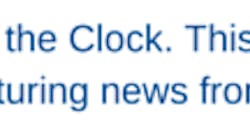My May 2018 column, “Good Leaders: More Crucial Than Ever,” presented the challenges facing employers as the available workforce with needed skills is declining. I made the points that the economy is booming and that good workers can readily find other jobs. I also pointed out the reasons why people leave jobs: They work for a bad boss; they don’t feel valued; and/or they see a better future elsewhere.
In response, a reader emailed me and asked me to address the issue of plant managers, directors, and vice presidents making comments such as, “I concern myself only with what I can control; I cannot control how people feel.” So, let’s do that! Here’s my take.
My immediate thought is that a senior leader who does not recognize his or her role in how people feel has reached the “Peter Plateau.” The Peter Plateau is a term that came from Laurence Peter and Raymond Hull in the 1969 book “The Peter Principle.” The Peter Principle states: “People will be promoted to their level of incompetence.”
The Peter Principle reasons that a person who is competent at his or her job will be promoted to a more-senior position. That more-senior position requires different skills. If the leader lacks the skills needed for success in the new, higher position, then he or she is not competent at that position. Leaders who learn the new skills can be promoted again. In some cases, a leader doesn’t get a promotion, but the organization grows and expands the leader’s responsibilities while not changing the description of the position. Eventually, the leader reaches a level where he or she doesn’t learn the skills required for success. That leader reached his or her plateau.
As leaders achieve greater seniority or responsibility, they affect more people through their actions or inactions. Senior leaders who haven’t learned about their influence on how people feel will create or perpetuate problems.
Let’s look at how senior leaders can improve norms related to the top reasons that people leave a job:
This article is part of our monthly Human Capital column. Read more from Tom Moriarty.
- Bad bosses: A senior leader needs to be focused on the performance of subordinate managers and supervisors. Provide productive leadership training and coaching so that poor subordinate leaders can improve. If poor leaders are provided training and coaching and they do not improve, they need to be replaced. Improving managers’ and supervisors’ leadership practices or removing these individuals will have a positive effect on the workforce.
- Feeling valued: The best way to make people feel valued is to communicate with them. Tell your team how their work contributes to the success of the organization. Share information about business performance. Create opportunities for people to feel successful; let them solve problems and set performance goals. As my friend Winston Ledet used to say, “Every pair of hands comes with a free brain.”
- Better opportunities elsewhere: In an average economy, compensation is not a strong driver for people to leave their job. The U.S. Labor Department recently reported that industry wages for 2018 are up 2.8% year over year, and in an accelerating economy with experienced workers retiring and a tight pool of qualified persons to fill open roles, pay and benefits become more important. Employees are in the driver’s seat. If you fix or get rid of bad bosses and make team members feel more valued, you’ll give employees fewer reasons to leave. When morale is high, people are more content and loyal. Senior leaders who refuse to recognize reality will lose in the talent competition.
Whether you are a line supervisor or a CEO, your job includes looking out for your team members. It is incredibly poor judgment for leaders to abdicate their responsibility for how team members feel. I agree that you can never know with certainty what a person thinks or feels. But you have to be aware of the effects that your policies and decisions have in order to preserve or improve their perspective.
Senior leaders need to be fully engaged in hiring and developing leaders. Turnover and reduced productivity cost much more than assertive coaching and periodic leadership training. Show team members respect by dealing with bad bosses and valuing team-member contributions. Advocate for competitive wages and benefits. Do the things that increase morale to make it harder for people to leave.


